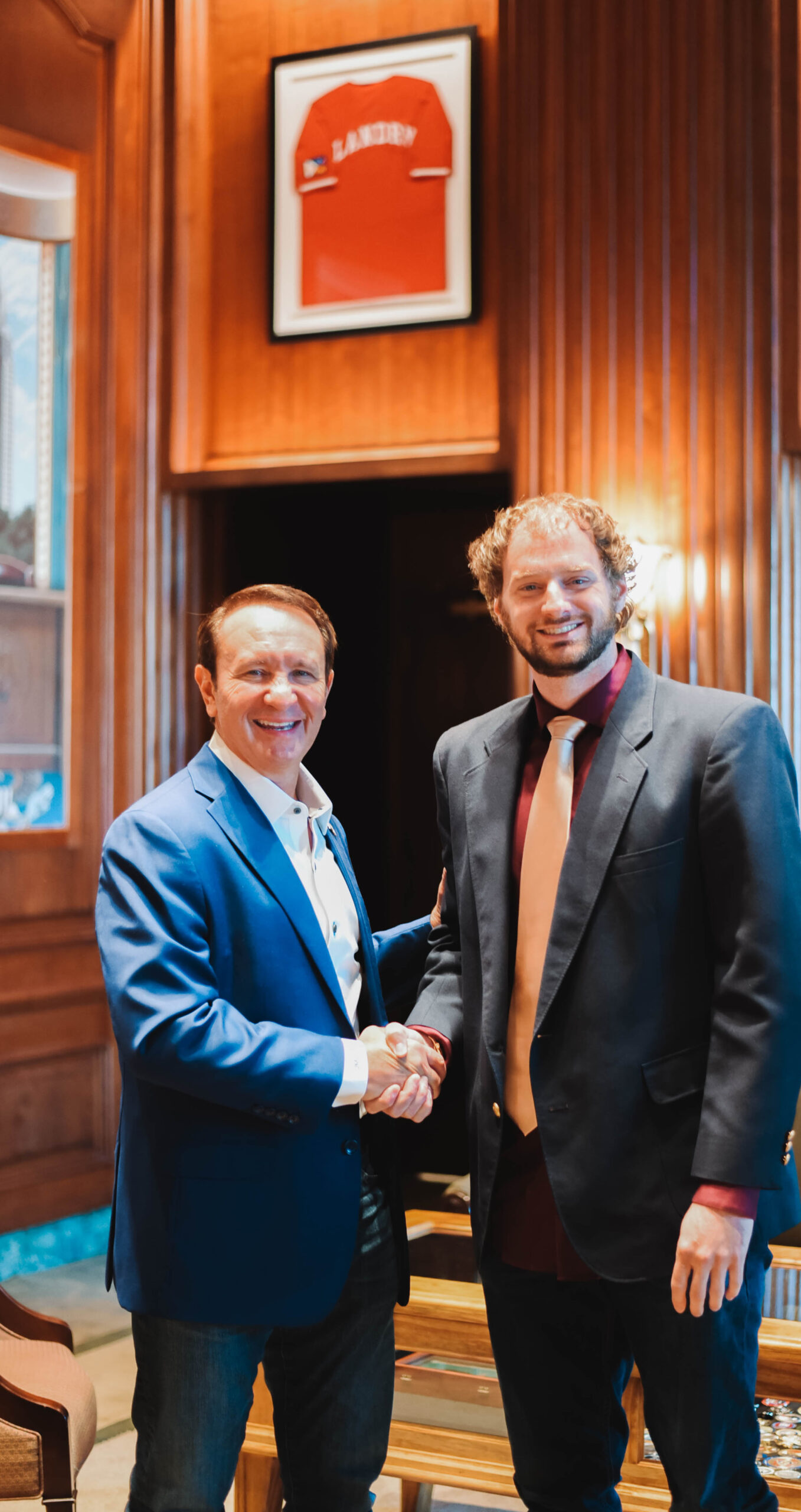Jeffrey Martin Landry is a proud husband and father and is now the 57th governor of Louisiana. A born-and-bred Cajun (down to working in sugar cane fields), Landry’s life of service began early: he was a member of the Louisiana National Guard for 11 years, beginning his stint while still in high school. In addition to that, he also served time as a police officer in Parks, Louisiana, and as a sheriff ’s deputy in St. Martin Parish, his home. He graduated from the University of Southwestern Louisiana in Lafayette (now UL-Lafayette) and later got his J.D. at Loyola in New Orleans. Before being elected governor, he was the 45th Attorney General of Louisiana from 2016 to 2024. He served one term in the U.S. Congress from 2011-2013 as the last representative for the old 3rd Congressional District, which covered the southeastern and south-central parts of the state where Landry was from. This was redrawn after the results of the 2010 census and now encompasses mainly southwest Louisiana. Complications running against a stout incumbent in the 2012 election stymied his future congressional ambitions. Not to be deterred, Landry stayed in the public service life, winning the attorney general election two years later.
After sweeping his opponents by winning over 50% of the vote in a state that just voted for a Democratic governor for two terms, Landry’s first year as governor is over. A special session on tax reform just wrapped in November, and after making a few headlines his first year, it feels like he’s just getting started. The governor graciously let SB visit him in his Fourth-Floor office of the largest Capitol in the country for an interview (this interview took place October 16, 2024).
Are you realizing a long-held dream of being governor.
“Look, I couldn’t tell you that all I wanted to do was be governor when I was a child. Actually, I wanted to be a wildlife and fisheries agent (laughs). But certainly, as I got involved in politics, I think that all of us who grew up at an age where governors seemed to get a lot done always had aspirations of ‘I bet it’d be nice if you were the governor,’ but I didn’t start off my political career with the objective of running for governor. I know it’s hard for a lot of people to believe that, but it’s true. When I ran for state senator, and lost, I thought I was pretty much done with politics; I said, ‘I’ll help and do whatever,’ and then I ran for Congress, and I won that, and I had an opportunity to run for attorney general while I was in Congress and refused that because I wanted to finish out my term in Congress, and when I lost the congressional district in the congressional race and ran for attorney general… even when Eddie Rispone and Ralph Abraham (former 2019 gubernatorial candidates) ran I supported both of them as a means to the governorship so… no, I just do my job, and everything seems to work out.”
Shreveport has been limping since NAFTA in the mid-90s… what do you have in mind to help Shreveport and the northwest part of the state in general?
It’s not only Shreveport or the northwest part of the state that’s been limping after NAFTA; I think all of Louisiana has been limping after it. I come from a small town down in St. Martinville, and I watched NAFTA destroy that town when Fruit of the Loom moved its textile facilities out of that town… I would also say, in that vein, I’m interested in helping all of Louisiana. I do believe that the I-20 corridor poses the greatest economic opportunity that Louisiana has right now for a number of reasons. I think property insurance and some of the insurance issues are much more easily handled up in north Louisiana. They’re harder to deal with down in south Louisiana because of the coastline, and I believe that some of the businesses or industries that are looking for places to expand their operations in the United States and bring more manufacturing and opportunities into the country, I think it fits inside the I-20 corridor. So, I would be excited if I lived in Shreveport.
Have you ever been to Shreveport, and what did you think of it?
Oh, I’ve been to Shreveport several times. I used to visit Shreveport when I was in the environmental business and in the businesses that I had (Landry previously owned an oil and gas environmental services company before getting into the public sector). I spent time in Shreveport as a congressman, as the attorney general, and as the governor.
You’ve signed many insurance bills this year… how is the future looking for the home insurance situation?
I am still cautiously optimistic, even in light of the damage that hurricanes have done to the country and the southern part of the country this year. We signed 26 pieces of tort reform. Many of those pieces were designed to help attract property insurance companies to Louisiana. I think the insurance commissioner said that he felt that their meeting in England with the reinsurers out in London was very positive, so I’m hoping that helps us. I also think that there may be a little silver lining on the storms that affected the southeastern part of the country in that many of those towns, I’m sure in North Carolina and in Georgia and Tennessee, were not inside of floodplains and were not required to carry flood insurance, but absolutely did flood. I think that may force Congress to look at the NFIP program (National Flood Insurance Program) a little more carefully, and maybe they’ll make it equitable, and I think that would be a big plus for us as well.
Is there a state you are using as a model for Louisiana, or are you chartering our course as a state? Would you like Louisiana to be an example to other states of what a GOP-dominated conservative state could be?
Well, my answer is all of the above. If I had to look at a state, I’d always be very close to a number of people in South Carolina, and I think it shares a lot of commonalities with Louisiana. It’s a coastal state; there’s some marsh there, and they have ports… They seem to have got it right about 30 years ago, and you see it. Boeing manufacturing is over there; they’ve got a number of car plants there, and their economic development is robust, and their quality of life has certainly been increased. So, if I look for a comparison, I kind of look towards South Carolina and North Carolina, but again, I think Louisiana has an opportunity to break out as a part of that question. When you look at other states, lay them next to us, look at the natural resources they have or their assets, and then look at ours, we stand head and shoulders above them. The sad part is we have not been able to utilize that, fully leverage it, or capitalize on it. I think the tax reform package we’re putting out and bringing the legislature in during that special session is a big step in that direction (the November special session).
Do you have a favorite governor?
Henry McMaster of South Carolina, I’m a big fan of his. Sarah Huckabee (Arkansas), there’s Kristi Noem (South Dakota, since nominated as Secretary of Homeland Security in the upcoming Trump administration). I’ve gotten to know Bill Lee from Tennessee; he’s been very helpful to us as we try to restructure the Department of Transportation and Development (DOTD). Greg Abbott (Texas)… This country is blessed, certainly in the red states, with many great governors.
You sent National Guard troops to Texas to help with their border didn’t you?
I did, I did. And we just sent some National Guard troops to Florida to help Ron DeSantis, and Ron was another person I also knew during his congressional days. Put it to you this way: Our bench is a whole lot stronger than the other teams.
Whether it was in the Rust Belt states or Texas or wherever the illegals are getting brought in, could the National Guard be used to send them out somewhere?
That’s part of the problem… ever since the Supreme Court case of Arizona v. United States (a 2012 case where the Supreme Court struck down three of four provisions Arizona had just signed into law in SB 1070 to curb illegal immigration at the state level), Janet Brewer was the governor at the time… that case has really handicapped states in trying to deal with a federal government that ignores their immigration laws. Look, I’m extremely hopeful and optimistic that Donald Trump will be elected as president, and I’m hoping that we keep the House, improve our margins in the Senate, and maybe fix our immigration once and for all.
What did you think about being the center of attention around the Ten Commandments bill over the summer?
That bill caught me off guard. I didn’t anticipate the amount of hoopla. I didn’t think it would be as big of a deal as it was. I didn’t know the Ten Commandments was that bad of a way of life to live… but I can tell you, the compliments that we get on signing that bill, of course, Dodie Horton (R-Haughton) authored it… the compliments I get that I appreciate the most are from teachers, retired teachers, who taught at a time when the Ten Commandments and God were still in our public schools. I’ve always believed that the Supreme Court got it wrong in the 1940s (likely a reference to McCollum v. Board of Education in 1948 that using public schools for religious instruction violated the Establishment Clause of the First Amendment). I’m hoping that this is the beginning of turning it back around and getting us back to our fundamental principles here in this country.
What is your hope for Louisiana over the next eight years? What goals do you have in mind?
Our goal is to bring people back home. We start with the motto ‘Come back home,’ and we want to welcome people back to Louisiana. My goal would be to see Louisiana slow its outward migration problem in the next census and see if we can’t get a positive number instead of a negative number; that would be a change. That hadn’t happened in… I hate to say three decades, but it could be.
Are there policies from other states (you mentioned North and South Carolina) that you would want to bring to Louisiana?
We’ve taken many of the things that we’ve done from other governors. Some of the stuff that we did in our crime package was what Sarah Huckabee had done in Arkansas right before us. Some of the tax reform pieces that we have were complemented by things that North Carolina did, and we saw a lot of southern states do away with or begin to phase out their income tax, which seems extremely popular. I hate the income tax; I don’t think the government should be able to tax what God gave you, which is your labor; that’s the only thing you have. The fact that the government can do that seems to be… it’s just wrong. Of course, we also used a number of other states when we did our education reform; I think we became the 11th or 12th state to institute ESAs… look, we don’t have to invent everything; we can be good ‘copy-catters’ and improve on things that people have done before. I’m always a big believer in finding the stones people stumbled on and ensuring we don’t stumble on those.
What’s your favorite memory as governor?
We’ve only been here about 11 months now… well after watching LSU beat Ole Miss the other day, it’s pretty hard to think of anything bigger than that (laughing)… look we’ve enjoyed it all, really and truly. I think the best times of being a governor are when you just go out and see people spontaneously and have people walk up to you and tell you thank you for the job that you’re doing. To me, that’s worth more than anything else.
Does being Louisiana’s governor beat being the House rep?
Oh, yes, absolutely… Washington’s so dysfunctional. I liked my time in Congress, and in the House there’s a lot of collegiality to being a House member. Of course, it’s nice because if you make a decision, and it’s a bad decision, you normally have a bunch of people making the same one as you. As governor, you sit kind of up on top of a mountain, and your bad decisions are right there for everyone to see, and you own it.
What’s your biggest concern for the state of Louisiana?
My biggest concern is that we don’t have the legislative will to do what we need to do. That’s what’s always held us back. I think that what’s unique about the time period we’re in right now is The vast majority of Louisianians are ready for some change, and they’re willing to take a shot at anything, so the question is whether or not we can get the legislature to agree with the people.
Are you thinking beyond your time as governor?
I can’t wait to go back to the private sector. It’s been 14 years now, just about… no, not really. I am focused on trying… when I leave, I want there to have been generational changes, structural changes, that place Louisiana on the path to some success. And I think we have an opportunity to do it, I do. I really, really do. I think we’ve got some great economic development projects that we will hopefully announce in the next 60-90 days, and I’m hopeful we’ll have more after that. The ones we will announce will cause some reverberation around the country, and people will say, ‘Man, what is Louisiana doing?’
Thank you Simone Koskie for providing her photography talents during this interview.










